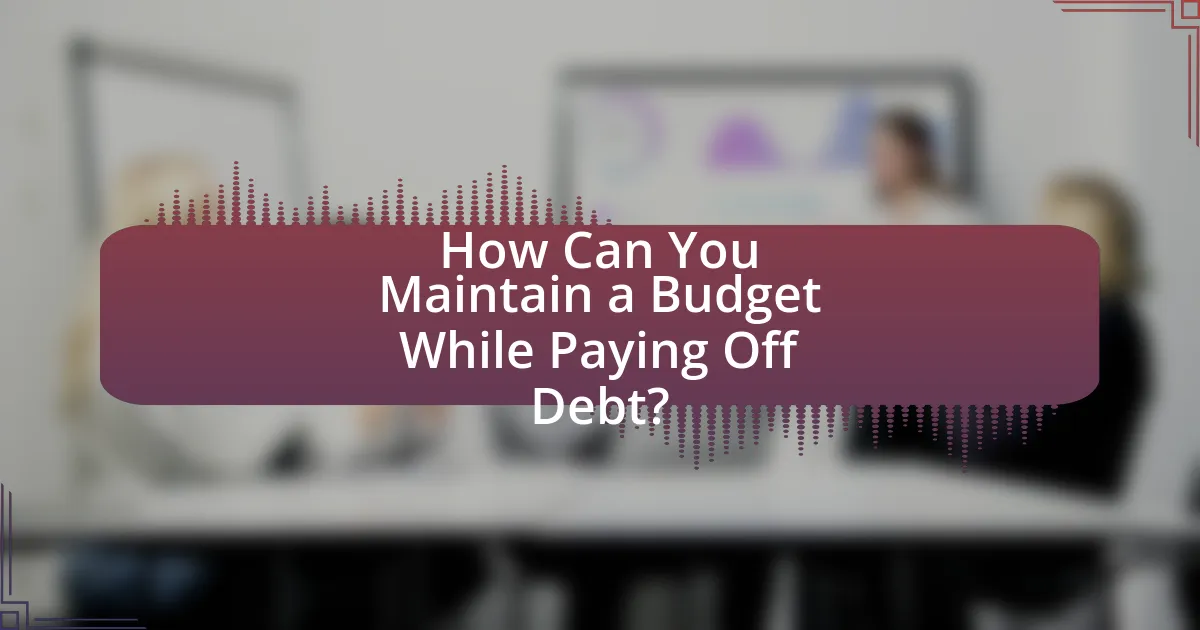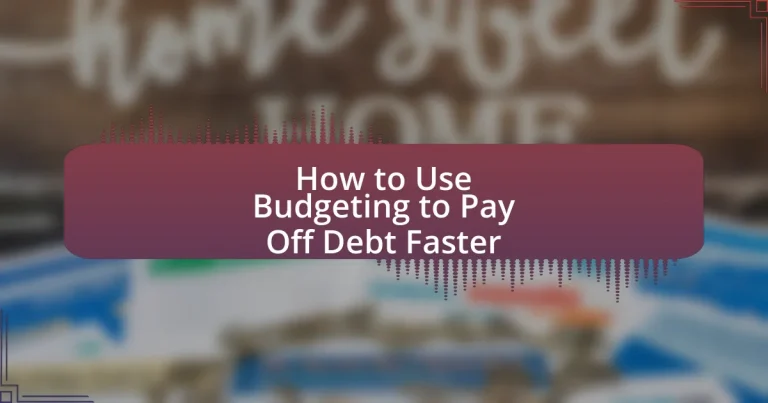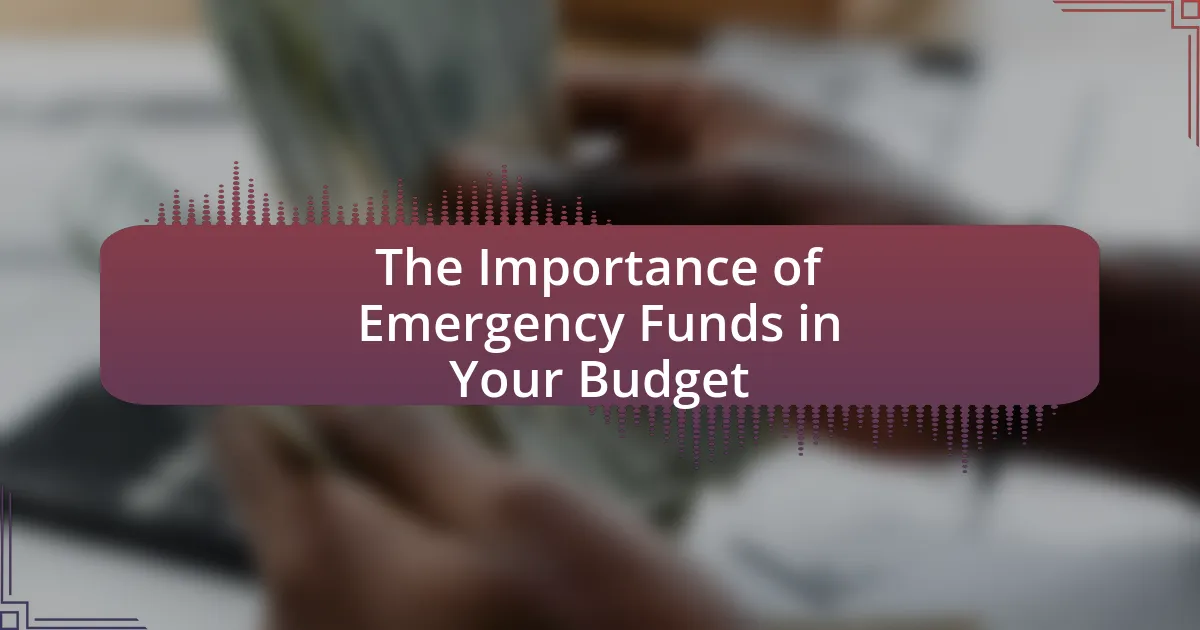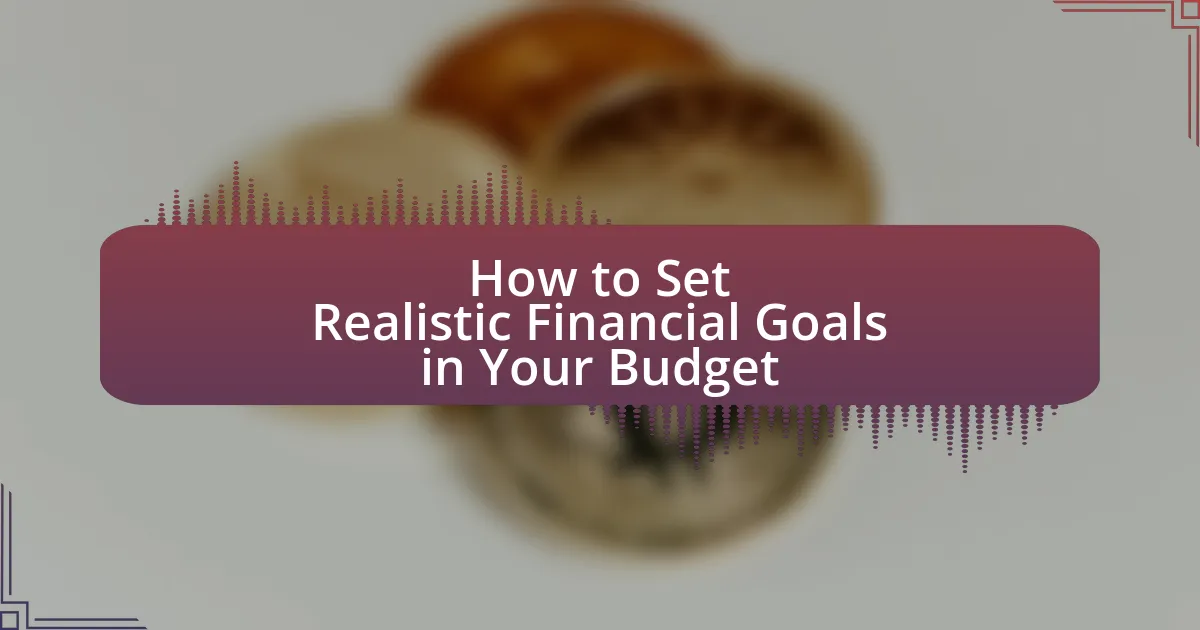Budgeting is a strategic financial planning process that helps individuals manage their income and expenses effectively, particularly in the context of debt repayment. This article explores how budgeting can accelerate debt payoff by enabling individuals to track spending, prioritize debt payments, and implement effective strategies such as the debt snowball and avalanche methods. Key components of an effective budget, the psychological benefits of budgeting, and the importance of setting financial goals are discussed, along with practical tips for maintaining a budget and avoiding common mistakes. The article emphasizes that individuals who actively engage in budgeting are more likely to reduce their debt levels and achieve financial stability.

What is Budgeting and How Can It Help Pay Off Debt Faster?
Budgeting is the process of creating a plan to manage income and expenses, allowing individuals to allocate funds effectively. By tracking spending and prioritizing debt repayment within a budget, individuals can identify areas to cut costs and redirect those savings toward paying off debts more quickly. Research indicates that individuals who use budgeting techniques can reduce their debt by up to 20% faster than those who do not budget, as they are more aware of their financial situation and can make informed decisions about their spending.
How does budgeting work in relation to debt repayment?
Budgeting directly facilitates debt repayment by allocating specific amounts of income towards paying off debts. By creating a budget, individuals can identify their income sources and expenses, allowing them to prioritize debt payments over discretionary spending. For instance, the 50/30/20 budgeting rule suggests that 20% of income should be directed towards savings and debt repayment, which can accelerate the process of becoming debt-free. This structured approach ensures that individuals consistently contribute to reducing their debt, ultimately leading to lower interest payments and improved financial health.
What are the key components of an effective budget?
The key components of an effective budget include income, expenses, savings, and debt repayment. Income represents the total earnings from all sources, while expenses encompass all necessary and discretionary spending. Savings should be allocated for emergencies and future goals, and debt repayment focuses on paying off existing obligations. According to a study by the National Endowment for Financial Education, individuals who track their spending and create a budget are more likely to achieve their financial goals, including paying off debt faster.
How can tracking expenses improve budgeting for debt repayment?
Tracking expenses enhances budgeting for debt repayment by providing a clear overview of spending habits, which allows individuals to identify areas where they can cut costs. By analyzing these expenses, individuals can allocate more funds toward debt repayment, thereby accelerating the process. Research indicates that people who track their spending are 50% more likely to stick to their budgets, leading to more effective debt management. This systematic approach not only fosters financial discipline but also helps in setting realistic repayment goals based on actual income and expenditure patterns.
Why is budgeting essential for managing debt?
Budgeting is essential for managing debt because it provides a structured plan to allocate income towards debt repayment and essential expenses. By creating a budget, individuals can identify their income sources, track their spending, and prioritize debt payments, ensuring that they meet financial obligations while avoiding additional debt. Research indicates that individuals who use budgeting techniques are more likely to reduce their debt levels effectively; for instance, a study by the National Endowment for Financial Education found that 70% of those who budget reported feeling more in control of their finances and were able to pay off debts faster.
What are the psychological benefits of budgeting for debt management?
Budgeting for debt management provides significant psychological benefits, including reduced anxiety and increased control over financial situations. By creating a budget, individuals can visualize their income and expenses, which fosters a sense of empowerment and clarity. This structured approach helps to alleviate the stress associated with uncertainty about finances, as it allows individuals to plan for debt repayment systematically. Research indicates that individuals who engage in budgeting report lower levels of financial stress and greater overall well-being, as they feel more in charge of their financial destiny. Furthermore, achieving budgeting goals can enhance self-esteem and motivation, reinforcing positive financial behaviors and contributing to long-term financial health.
How does budgeting create accountability in debt repayment?
Budgeting creates accountability in debt repayment by establishing a clear financial plan that outlines income, expenses, and debt obligations. This structured approach allows individuals to track their spending and allocate specific amounts toward debt repayment, ensuring that they prioritize paying off debts. Research indicates that individuals who use budgeting are more likely to adhere to their financial commitments, as it fosters a sense of responsibility and awareness regarding their financial situation. For instance, a study by the National Endowment for Financial Education found that 70% of individuals who budget reported feeling more in control of their finances, which directly correlates with improved debt repayment outcomes.

What Strategies Can Be Used in Budgeting to Accelerate Debt Payoff?
To accelerate debt payoff, individuals can implement strategies such as the debt snowball method, prioritizing high-interest debts, and creating a zero-based budget. The debt snowball method involves paying off the smallest debts first to build momentum, while prioritizing high-interest debts minimizes the total interest paid over time. A zero-based budget allocates every dollar of income to expenses, savings, or debt repayment, ensuring that surplus funds are directed toward debt reduction. According to a study by the National Endowment for Financial Education, individuals who actively budget are more likely to successfully manage and reduce their debt.
How can prioritizing debts impact budgeting effectiveness?
Prioritizing debts significantly enhances budgeting effectiveness by allowing individuals to allocate resources more strategically. When debts are prioritized, individuals can focus on paying off high-interest debts first, which reduces the overall interest paid over time and accelerates debt repayment. For instance, according to a study by the National Foundation for Credit Counseling, prioritizing high-interest debts can save consumers thousands in interest payments, thereby freeing up more funds for essential expenses and savings. This structured approach to debt repayment not only improves financial stability but also fosters a more disciplined budgeting process, leading to better long-term financial health.
What methods can be used to prioritize debts in a budget?
To prioritize debts in a budget, individuals can use methods such as the debt avalanche and debt snowball strategies. The debt avalanche method focuses on paying off debts with the highest interest rates first, which minimizes the total interest paid over time. In contrast, the debt snowball method emphasizes paying off the smallest debts first, which can provide psychological motivation through quick wins. Research indicates that the debt avalanche method is more cost-effective, as it reduces the overall interest burden, while the snowball method can enhance adherence to a debt repayment plan due to its motivational benefits.
How does the snowball method work in budgeting for debt repayment?
The snowball method in budgeting for debt repayment involves paying off the smallest debts first while making minimum payments on larger debts. This strategy creates a psychological boost as individuals experience quick wins, which can motivate them to continue the repayment process. By focusing on the smallest debt, once it is eliminated, the freed-up funds can then be applied to the next smallest debt, creating a “snowball” effect as the repayment momentum builds. Research indicates that this method can lead to higher rates of debt repayment due to the increased motivation from achieving small victories.
What role does setting financial goals play in budgeting?
Setting financial goals is crucial in budgeting as it provides direction and motivation for managing expenses and savings. By establishing specific, measurable, achievable, relevant, and time-bound (SMART) goals, individuals can prioritize their spending and allocate resources effectively. Research indicates that people who set financial goals are more likely to stick to their budgets and achieve their desired financial outcomes, such as paying off debt faster. For instance, a study published in the Journal of Financial Planning found that individuals with clear financial goals reported higher levels of financial satisfaction and were more successful in debt reduction strategies.
How can short-term and long-term goals be integrated into a budget?
Short-term and long-term goals can be integrated into a budget by allocating specific portions of income to each type of goal, ensuring that both immediate needs and future aspirations are addressed. For instance, a budget can designate a percentage of monthly income for short-term goals, such as saving for a vacation or paying off a small debt, while also setting aside funds for long-term goals like retirement savings or a home purchase. This approach allows individuals to prioritize their financial objectives effectively, balancing current expenditures with future financial security. Research indicates that individuals who set clear financial goals are more likely to achieve them, as evidenced by a study published in the Journal of Financial Planning, which found that goal-setting significantly enhances financial behavior and outcomes.
What are some examples of realistic financial goals for debt repayment?
Realistic financial goals for debt repayment include setting a specific monthly payment target, aiming to pay off high-interest debts first, and establishing a timeline for becoming debt-free. For instance, a goal could be to allocate 20% of monthly income towards debt repayment, which is a common recommendation for effective budgeting. Additionally, focusing on paying off credit card debt with an average interest rate of 15% or higher first can save money in interest payments over time. Establishing a clear timeline, such as aiming to eliminate all debt within three years, provides a measurable framework for progress. These goals are supported by financial planning principles that emphasize prioritizing high-interest debts and maintaining a consistent repayment strategy.

How Can You Maintain a Budget While Paying Off Debt?
To maintain a budget while paying off debt, prioritize essential expenses and allocate a specific portion of your income towards debt repayment. This approach ensures that necessary living costs are covered while systematically reducing debt. For instance, the 50/30/20 budgeting rule suggests allocating 50% of income to needs, 30% to wants, and 20% to savings and debt repayment. By adhering to this structure, individuals can effectively manage their finances, ensuring that debt obligations are met without sacrificing essential living standards.
What tools and resources can assist in maintaining a budget?
Budgeting tools and resources that assist in maintaining a budget include budgeting apps, spreadsheets, and financial planning websites. Popular budgeting apps like Mint and YNAB (You Need A Budget) allow users to track expenses, set financial goals, and receive alerts for overspending. Spreadsheets, such as those available in Microsoft Excel or Google Sheets, provide customizable templates for tracking income and expenses. Financial planning websites, like NerdWallet and Personal Capital, offer budgeting calculators and resources for financial education. These tools enhance budget management by providing real-time tracking, visual representations of spending habits, and personalized financial advice, which can lead to more effective debt repayment strategies.
How can budgeting apps enhance debt repayment efforts?
Budgeting apps enhance debt repayment efforts by providing users with tools to track expenses, set financial goals, and create personalized repayment plans. These applications allow individuals to visualize their spending habits, identify areas for cost-cutting, and allocate more funds toward debt repayment. For instance, a study by the National Endowment for Financial Education found that individuals who use budgeting tools are 20% more likely to stick to their financial plans, leading to faster debt reduction. Additionally, budgeting apps often include features like reminders for payment due dates and alerts for overspending, which help users stay accountable and avoid late fees, further accelerating their debt repayment journey.
What are the benefits of using spreadsheets for budgeting?
Using spreadsheets for budgeting offers several key benefits, including enhanced organization, real-time tracking, and customizable analysis. Spreadsheets allow users to systematically categorize income and expenses, making it easier to visualize financial data. This organization facilitates real-time tracking of spending patterns, enabling users to adjust their budgets promptly. Additionally, spreadsheets can be tailored to individual needs, allowing for specific calculations, such as debt repayment schedules, which can help users pay off debt faster. According to a study by the National Endowment for Financial Education, individuals who actively track their finances are more likely to achieve their financial goals, reinforcing the effectiveness of spreadsheets in budgeting.
How can you adjust your budget as your financial situation changes?
To adjust your budget as your financial situation changes, first, assess your current income and expenses to identify any shifts. For example, if your income decreases due to job loss or reduced hours, prioritize essential expenses and reduce discretionary spending. Conversely, if your income increases, allocate a portion of the additional funds towards debt repayment or savings. Regularly reviewing your budget, at least monthly, allows you to make timely adjustments based on changes in your financial situation. According to a study by the National Endowment for Financial Education, individuals who actively manage and adjust their budgets are more likely to achieve financial stability and reduce debt effectively.
What signs indicate that a budget needs to be revised?
Signs that indicate a budget needs to be revised include consistent overspending, unexpected expenses, and changes in income. Consistent overspending occurs when actual expenses exceed budgeted amounts over several months, signaling that the budget may not accurately reflect spending habits. Unexpected expenses, such as medical bills or car repairs, can disrupt financial plans and necessitate adjustments to the budget. Changes in income, whether due to job loss, salary reduction, or increased earnings, require a reevaluation of budget allocations to ensure financial stability. These indicators highlight the need for a budget revision to align financial plans with current circumstances.
How can unexpected expenses be managed within a budget?
Unexpected expenses can be managed within a budget by establishing an emergency fund that covers at least three to six months of living expenses. This fund acts as a financial buffer, allowing individuals to address unforeseen costs without disrupting their regular budget. According to a 2021 survey by Bankrate, only 39% of Americans could cover a $1,000 emergency expense with savings, highlighting the importance of having a dedicated fund. By allocating a portion of monthly income to this emergency fund, individuals can effectively prepare for unexpected expenses while maintaining their overall financial stability and progress toward debt repayment.
What are some practical tips for successful budgeting to pay off debt faster?
To pay off debt faster through successful budgeting, prioritize creating a detailed budget that tracks all income and expenses. This allows for identifying unnecessary expenditures and reallocating those funds toward debt repayment. Implement the debt snowball or avalanche method to systematically reduce debt, focusing on either the smallest debts first or those with the highest interest rates, respectively. Additionally, set specific financial goals and deadlines to maintain motivation and accountability. Regularly review and adjust the budget to reflect changes in income or expenses, ensuring that the plan remains effective. According to a study by the National Endowment for Financial Education, individuals who actively budget are more likely to achieve their financial goals, including debt reduction.
How can regular budget reviews improve debt repayment progress?
Regular budget reviews can significantly enhance debt repayment progress by allowing individuals to identify spending patterns and adjust their financial strategies accordingly. By consistently analyzing their budget, individuals can pinpoint areas where they can cut unnecessary expenses, thereby reallocating those funds toward debt repayment. Research indicates that individuals who engage in regular financial monitoring are more likely to achieve their financial goals, including debt reduction. For instance, a study published in the Journal of Financial Counseling and Planning found that participants who reviewed their budgets monthly were able to reduce their debt by an average of 20% over six months, compared to those who did not engage in regular reviews. This demonstrates that systematic budget assessments not only foster awareness of financial habits but also facilitate more effective debt management strategies.
What common budgeting mistakes should be avoided when paying off debt?
Common budgeting mistakes to avoid when paying off debt include underestimating expenses, neglecting to prioritize high-interest debt, and failing to track spending. Underestimating expenses can lead to budget shortfalls, making it difficult to allocate sufficient funds for debt repayment. Neglecting high-interest debt can result in increased overall costs due to accruing interest, which prolongs the repayment period. Failing to track spending prevents individuals from identifying areas where they can cut back, ultimately hindering their ability to pay off debt efficiently. These mistakes can significantly impede progress in debt repayment and financial stability.





